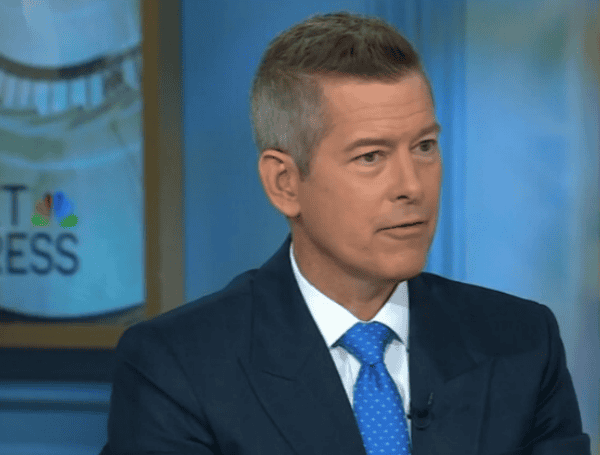Following multiple communication and radar outages at Newark Liberty International Airport (EWR), Transportation Secretary Sean Duffy appeared on NBC’s “Meet the Press” Sunday to address mounting flight safety concerns ahead of the busy summer travel season.
The most recent incident occurred early Friday morning when air traffic controllers at the facility lost radar displays for 90 seconds. This follows several other instances since August where planes temporarily lost contact with air traffic control at one of the nation’s busiest airports.
Speaking with host Kristin Welker, Secretary Duffy acknowledged the gravity of the situation, attributing the problems to an aging national air traffic control system, which he described as “25 at best, sometimes 50 years old.”
READ: Duffy Vows “Brand New State-Of-The-Art” U.S. Air Traffic Control System
“The Congress and the country haven’t paid attention to it… the lights are blinking, the sirens are turning, and we’re saying, listen, we have to fix this because what you see in Newark… is going to happen in other places across the country,” said Fuffy.
He detailed the specific issues at Newark, citing “Telecom issues” and “glitches in our software” where incoming information overloads lines, causing the system to go down.
Despite the incidents, Duffy insisted that flying in and out of Newark is currently safe. “It is safe,” he stated, adding that he and his family fly out of Newark regularly. He explained that when issues occur, “there are policies and procedures in place for controllers and for pilots. They know what to do… they and we vacate the airspace.”
However, he stressed the urgent need for long-term fixes. Calling it an “American issue” and a necessary “American Congressional priority,” Duffy said it would require a “three or four year build” to upgrade the system, requiring significant funding.
In the immediate term, Duffy confirmed that the FAA has already reduced the number of flights operating in and out of Newark. This decision was made to ensure safety, particularly because the connectivity issues have reportedly led to some controllers becoming stressed and leaving, resulting in fewer controllers managing the airspace.
READ: Groups Suing For Biden-DOJ Interview Recording Explain What’s At Stake
“We slow it down and keep people safe. That’s what we do,” Duffy said, noting that this reduced capacity is expected to last for the “next several weeks.” He is convening a meeting with airlines serving Newark to agree on the reduction plan to minimize unexpected delays and cancellations for passengers.
Duffy also mentioned a specific fix for Newark’s data flow, aiming to create a direct line between Newark and the Philadelphia TRACON facility by the end of the summer, bypassing an unnecessary intermediate step.
Extending his concerns beyond Newark, Duffy stated he is worried about the “whole airspace” due to the age of equipment, some of which requires sourcing parts from places like eBay, and reliance on copper wires instead of modern fiber optics. While redundancies ensure safety now, he warned, “We’re seeing stress on an old network, and it’s time to fix it.”
Asked directly if it is safe to fly in the United States, Duffy replied, “We are the safest airspace… traveling by air is way safer than any other mode of transportation.” However, he acknowledged that a “major outage, could that be a risk to life? Of course, it could be, which is why we fix it.” He referenced past near misses as examples of risks that must be proactively addressed “before you lose life.”
Addressing a recent close call involving an Army Blackhawk helicopter at Reagan National Airport (DCA), Duffy suggested limiting military helicopter traffic, especially training missions, during peak times in the busy D.C. airspace, while acknowledging the need for some VIP flights.
Regarding the broader multi-billion-dollar overhaul he has announced, Duffy admitted it’s not an overnight fix, requiring years to build the infrastructure. However, he pledged to focus on Newark first for near-term resilience.
Duffy also discussed the ongoing air traffic controller shortage, currently standing at 3,000. While Congress has authorized raising the mandatory retirement age from 56 to 61, Duffy noted that many controllers retire earlier, after 25 years of service.
To combat this, he has approved raising the retirement age to 61 and is offering a $20,000 upfront bonus to experienced controllers to incentivize them to stay on the job. He also highlighted efforts to increase recruitment and training at the FAA Academy, acknowledging that training new controllers takes 1-3 years. He projected making up the 3,000-person difference over the next “one, two years” by retaining experienced staff and bringing in new trainees.
READ :Sean Duffy Fires Back At Hillary Clinton’s ‘Complaints’ Over DOT Teaming Up With DOGE
Finally, Welker asked if recent personnel cuts at the FAA, linked to discussions with Elon Musk, had worsened the situation.
Duffy strongly denied this, stating that no cuts were made to critical safety positions like air traffic controllers. He explained that the cuts affected probationary employees hired less than a year ago, most of whom have since returned.
He characterized the move as part of an effort to make the government more efficient while preserving the core safety mission, asserting that Mr. Musk understood the importance of maintaining a skilled air traffic control workforce.
Please make a small donation to the Tampa Free Press to help sustain independent journalism. Your contribution enables us to continue delivering high-quality, local, and national news coverage.
Connect with us: Follow the Tampa Free Press on Facebook and Twitter for breaking news and updates.
Sign up: Subscribe to our free newsletter for a curated selection of top stories delivered straight to your inbox.
